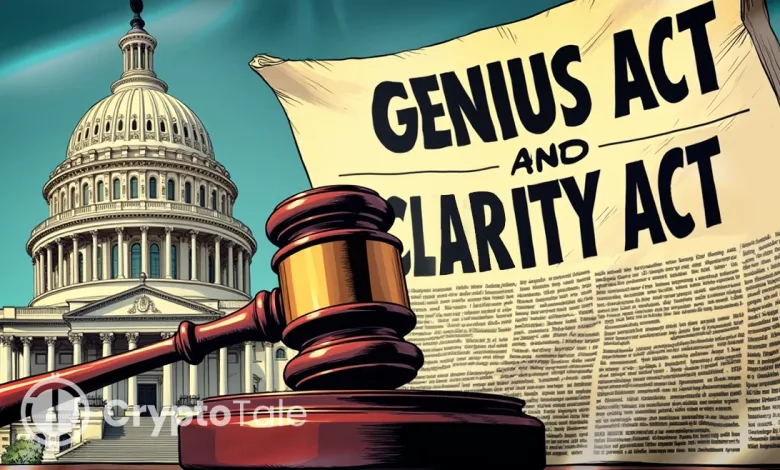Crypto Bills Advance as House Approves Rule With 217 Votes

- The House passed the procedural rule 217 to 212 after Republicans flipped sides.
- The GENIUS Act is set for a final vote, while the CLARITY Act is under discussion.
- Lawmakers aim to block the Fed from issuing a digital dollar by adding anti-CBDC bill to the NDAA.
The U.S. House of Representatives passed a procedural rule 217–212, ending a record-setting 10-hour voting delay that will now allow floor debates on several crypto-related bills, including the GENIUS Act and the CLARITY Act. The vote marks the longest in House history and was mainly driven by disagreements over digital asset policies, particularly regarding CBDC restrictions.
The crypto-focused breakthrough came after intense overnight negotiations and political maneuvering, with several GOP holdouts reportedly flipping positions in less than 24 hours. According to Fox Business journalist Eleanor Terrett, some of these lawmakers were seen late at the Capitol Hill Club before returning to vote. Their reversal was reportedly prompted by President Donald Trump’s involvement and direct engagement with party members at the White House.
Lawmakers Agree on Anti-CBDC Terms and Crypto Regulation Path
Republican leaders successfully secured agreement to include anti-CBDC provisions within the National Defense Authorization Act (NDAA), which helped gain critical conservative support for the vote.
The GENIUS Act (Guiding and Establishing National Innovation for U.S. Stablecoins Act) sets rules for stablecoin transparency, reserve banking, and customer safety. The CLARITY Act will provide guidelines for classifying crypto tokens under existing securities laws. The NDAA amendment would prevent the Federal Reserve from issuing a CBDC directly to individuals.
Wisconsin Representative Bryan Steil recorded a video from outside the Capitol building, calling the procedural vote a “critical step” toward comprehensive crypto regulation and confirming that the GENIUS Act would be brought to the floor imminently.
Senate-Approved Language Provides Strategic Flexibility
Although the House agreed to advance the Senate-passed resolution, the text itself does not move directly to the President’s desk. Reports explained that the procedural rule merely sets the stage for House and Senate leaders to move the bills separately, merge them into another legislative package, or draft a conference substitute that aligns both chambers’ positions.
This arrangement allows for legislative flexibility while pushing the individual bills closer to final passage. It also underscores the strategic interest of leadership in ensuring alignment between chambers to avoid delays in regulatory rollout.
Related: U.S. Senate Shifts Focus to Crypto Market Structure in Regulatory Push
Crypto’s Political Power Becomes Evident in Vote Outcome
The House’s decision to proceed followed Tuesday’s failed attempt, where a group of GOP hardliners joined Democrats in voting against the rule. But overnight discussions and political pressure—including a push from the president—reversed the trajectory. As a result, lawmakers secured the narrow margin needed to advance.The procedural win suggested that regulatory clarity for digital assets has ceased to be just a policy issue and has become increasingly political. Voter interest in crypto innovation, institutional pressure for clear guidelines, and conservative anxieties about CBDC surveillance all joined to unite lawmakers. Within the next 24 hours, it is expected that the final votes on the GENIUS Act, as well as the NDAA amendments, will be taken. Within the next week, the CLARITY Act may be addressed.




